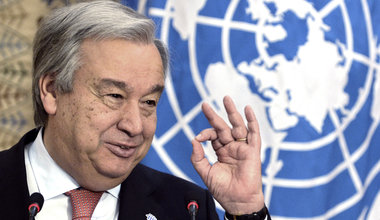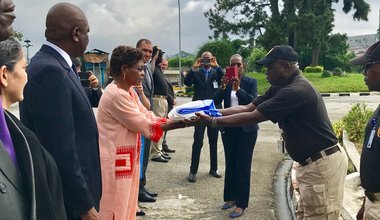Daily Brief on Cote d’Ivoire for Friday, 21 November 2008
- Identification to end in Abidjan on 29 November
- One person dies during demonstration against returning IDPs in the west
- UNOCI organizes seminar to help social cohesion in Bouna
Electoral process
The Independent Electoral Commission has announced that the identification and voter registration operation which started in Abidjan on 29 September 2008, will officially end on 29 November 2008. Meanwhile, 2,535 people have registered to vote since the launch of the operation in Bouaké on 18 November 2008. UNOCI has also made available an additional five vehicles to the IEC to transport staff and equipment to identification centres, bringing the total number of vehicles from the Mission to 17.
Security
One person was killed and another injured in Zéaglo, near Blolequin (west) yesterday, during demonstrations by the indigenous community against the return of foreigners and other settlers to plantations from which they were forcefully removed during the Ivorian crisis. Youths erected barricades and clashed with security forces to prevent local authorities from resettling farmers whose farms were now occupied by local people. The Sous Préfet of Zéaglo, Mr. Okou Tohouri, told UNOCI that Ivorian soldiers charged with escorting the returnees to their plantations were surprised by armed youths who fired at them. They in turn fired on the demonstrators, killing one of them. UNOCI staff has been advised to avoid any movement towards the area. A few weeks ago, local authorities encountered similar problems in Béoué viilage in the same area when returnees tried to return to their plantations.
Villagers in Semien, near Man (west) have told an UNOCI patrol that soldiers from the Armed Forces of the Forces Nouvelles have set up checkpoints leading to their farms, so that they are forced to pay crossing fees before they could go to their farms. They claimed that on 15 November 2008, a man was beaten and severely injured when he refused to pay up. The villagers also said that the FAFN soldiers collect "fees" from market stall holders as well.
Information and sensitisation
In response to the ongoing conflict between farmers and pastoralists over grazing rights in the Bouna area, UNOCI yesterday organised a seminar for civil society on the theme: "The implication of civil society in the promotion of a culture of peace and the reinforcement of social cohesion in Bouna". Some 60 participants from NGOs, women and youth associations, civil society groups and traditional chiefs took part in the training.
Similarly, the UN Working Group on Social Cohesion in the Vallée du Bandaman Region, organised a two-day forum today in Sakassou, 35km north of Bouaké on "Social Cohesion in a post conflict period: the Sakassou case" in an effort to generate ideas on activities and actions that would help the population and local authorities to restore a climate of peace and reconciliation among community members, particularly between farmers and cattle breeders and local and immigrant fishermen. Over 200 participants including traditional chiefs and religious leaders, fishermen and farmers, as well as local NGOs are expected to participate in the event.
Arms embargo
Arms embargo inspections were successfully carried out by UNOCI peacekeepers at the Defence and Security Forces of Cote d'Ivoire's (FDSCI) gendarmerie brigades in Guitry, Gagnoa, (centre-west), in Nassian, near Bondoukou (east), in Toumodi (centre) and Abengourou (east).
Human Rights
On 19 November 2008, the Regional Human Rights Office in Bouaké visited the civilian prison in Bouaké to assess detention conditions of two alleged FAFN deserters. They were detained on 17 November 2008 accused of being sympathizers of Sergeant-Chief Ibrahim Coulibaly alias IB. The Office discovered that the detainees had been denied access to visitors.
The Regional Human Rights Office in Duékoué on 19 November 2008 participated in a meeting organized by the Sous Préfét of Guiglo in Nicla village, 5 km from Guiglo, to defuse tension between Internally Displaced Persons (IDPs) who remained in the Centre d'Acceuil Temporaire des Déplacés (CATD) and villagers. The IDPs who have remained in Nicla village despite the official closure of the centre in July 2008, claimed that they were the victims of ethnically-motivated exactions committed by the indigenous community. As a result of the meeting, a local committee composed of local authorities, the village chief and representatives of the IDPs was set up to explore ways of organizing the safe return of the IDPs to their respective villages.
 ONU
ONU Nations Unies Maintien de la paix
Nations Unies Maintien de la paix



